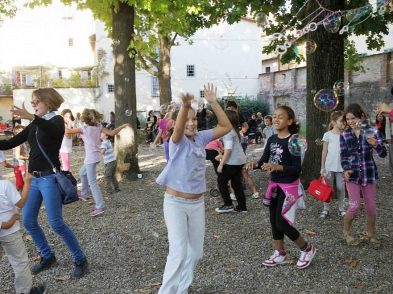Love is something cherished and rare, but for me, falling in love is
as unavoidable as tripping on uneven cobblestone. And it’s not my fault. For
those who have a weak spot for elderly men with kindly eyes and large private
art collections, Florence is the place. Its palaces are inhabited by
tweed-looking philosopher types whose ancestors conquered the Guidi counts or
did something equally heroic, like plant acres of vineyards that continue to
grow centuries later. Ieri, my darling of the day was a man whose first
name I cannot mention, partly for privacy and partly because gentlemen of his
caliber only reveal their true birth name to a woman after she has given him an
heir.
The utter ease of falling in love makes a body wonder why there is no
respectable phrase in English to describe the process of becoming enamored. The
word ‘enamor’ proves my point, to be sure, for not a soul has used that term
without sarcasm since Jane Eyre first fell in love with Mr. Rochester. Just why
is there no real verb for falling in love? And why are we forced to use a
phrase that implies plunging decline? In English, we use ‘fall’ for multiple
scenarios: you can ‘fall ill’ and ‘fall out of favor,’ and if things get
ghastly, you may ‘fall prey to an imposter’ or simply ‘fall to pieces’ after an
average day filled with mishaps. But why must the first spark of love be
grouped in with such grossly troublesome alternatives? ‘Falling in love’
implies plummeting into the love-pond straight from the sky, which is not a
problem at all unless the pond turns puddle upon landing.
All this said, any new love announcement must always be offhanded, dealt
like a face card whose value is still unrevealed. I usually wait for dinner to
be well underway before bringing up the day’s beloved.
‘I’m sorry to break it to you,’ I told Filippo last night.
‘Ma mi sono innamorata oggi…and
it’s that unexpected visceral sort of love that can only come out as a
confession.’
Filippo looked up at me and raised his eyebrows without surprise. ‘So,
am I the priest in this scenario?’
‘Only if you can marry me to him.’
Filippo shook his head. Then he pulled a bit of bread from his roll and
started to sop up the sauce on his plate. It was the essence of non-reaction.
‘You’re supposed to get jealous
or something,’ I told him.
‘He’s in his eighties, presumo.’
‘Seventies, I’d say.’
‘Seventy? You’re going younger than usual. There may be reason for me to
worry.’
‘You definitely should. This time it’s for real. It’s head over heels
love, I mean.’
‘Hai preso una bella sbandata,
insomma.’
‘Yes. Except I don’t know what sbandata means.’
‘It’s a sudden infatuation. Sbandare is when you are driving down
the road at full speed and decide to take a detour without warning.’
I nodded. ‘Well, leave it to Italians to equate love and race cars.’
Filippo answered wryly. ‘It’s more a question of deviating than racing.’
‘Well, then that’s pretty ugly. But I get it: it’s a crush.’
‘Yes. It’s like prendersi una cotta.’
When Italians are swept off their feet, they consider themselves
‘cooked’-either browned to perfection or baked to a crisp. Otherwise, those who
truly have it bad for someone can say prendersi una bella . The fact that English speakers use
‘bad’ and Italians use ‘beautiful’ to express an overwhelming fancy is a
cultural concept that I’m not yet skilled enough to tackle. On this point,
let’s meet back here in a year’s time and compare notes about it; certainly, it
will take us that long to formulate an adequate theory. What I can say today is
that Italian does have a real way to say ‘falling in love’ and it’s a
reflexive verb, no less. Innamorarsi. The word alone is cause for
infatuation. It’s the si tacked on the end that gets me: if lavarsi is ‘to wash oneself’ and chiedersi is ‘to ask oneself,’ what ultimately stops
us from thinking that innamorarsi is more akin to ‘being in love with
oneself’ than to ‘loving another’.
‘Why is innamorarsi riflessivo?’
I asked.
‘What?’ By this time, Filippo had put on his listening-man face, the
face men use when they crave quiet but pretend otherwise.
‘Why does it have the si on the end?’
‘How am I supposed to know?’ he
asked, disgruntled. ‘Ask your new love. He’ll know.’
‘It makes falling in love sound like loving oneself.’
There was no more sauce on his plate for Filippo to busy himself with.
‘Maybe it comes from the fact that, sometimes, love is self-generated.’
‘Really?’ I asked, intrigued. ‘Like something you make up on your own,
without necessarily involving the other person?’
‘Could be.’
‘I think that applies in this
case. My librarian guy didn’t look at me twice. I mean, he spent at least half
an hour trying to help me, but in the end, he went away assuming I was just
another book-borrower. But, he was so beautiful, Filippo. Bellissimo,
really.’
He smiled. ‘How come you never get crushes on 20-year olds?’
I looked at him straight. ‘I do; I just don’t tell you about them.’
He shook his head. ‘This is a lie. Te, non ti sei mai presa una cotta
per un ventenne, even when you were 20 yourself.’
‘Yes, but someday, it will happen,’ I told him with conviction. ‘The
60-year age difference is key. When I’m 80, I’ll love them too. No
distinguished librarians are 140 years old.’
‘Maybe not. But the retirement age is rising. If I were you, I’d keep
carrying the torch.’
Hmm. Carrying the torch. That’s another great one. More proof, of
course, that love is all around.








